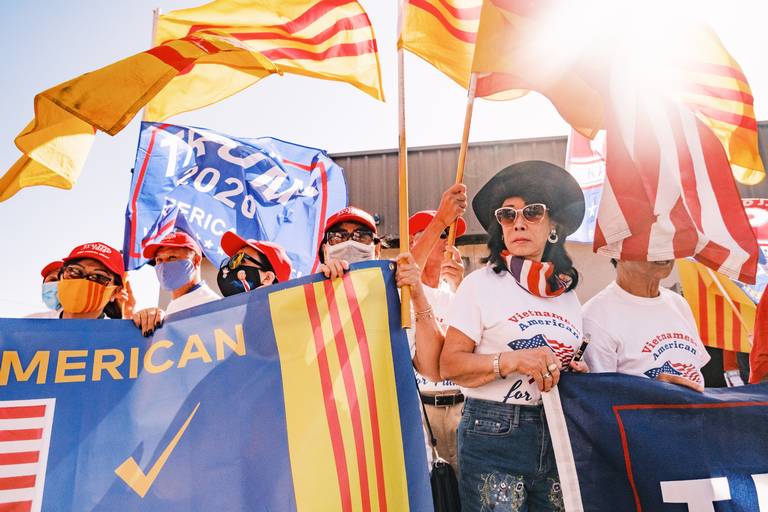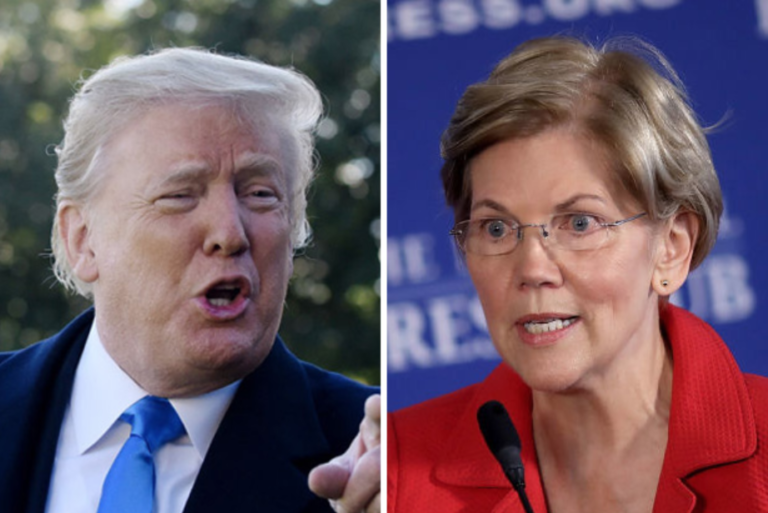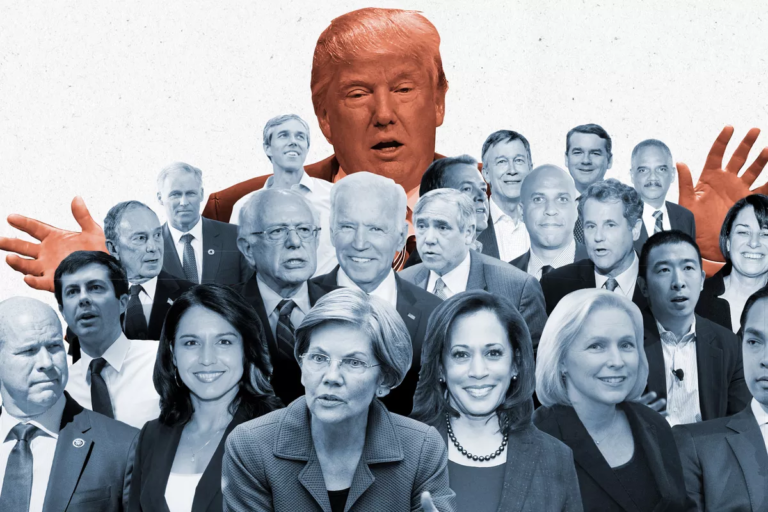
The first I learned of the mass Trump support among Vietnamese Americans was only days before the presidential election. Despite being a second-generation Vietnamese American, I grew up in a predominantly white town in Florida and knew little about the politics of Vietnamese Americans besides those within my nuclear family. My cousin, however, lives in Orange County, California, which has the largest Vietnamese population outside of the country itself. As we discussed the presidential election over the phone this October, she recounted interactions with Trump-supporting Vietnamese people and their massive rallies in her town. To say I was disturbed would be an understatement.
Her assertions about the degree of Trump support among the Vietnamese community were indeed true. A study released in September showed Vietnamese Americans to be the most right-leaning Asian American subgroup, with 48 percent of them saying they would vote for Trump versus 36 percent for Biden. And the abundance of Vietnamese Americans for Trump Facebook groups and YouTube videos of Viet Trump rallies certainly allowed a glimpse into the truth of the situation.
For me, I think hearing about how the Trumpism movement permeated the Vietnamese community was so shocking because of both perplexity and disappointment. The portrait of the welcoming Little Saigon neighborhood in Orange County I once visited being quashed by the toxicity of Trump country was disheartening. How could people reconcile being Vietnamese and supporting someone like Trump, who is so blatantly anti-immigrant and makes constant racist comments about Asians? To me, it felt like a vote against yourself and your community’s dignity.
The reality of it is, however, those remarks made by Trump often lie forgotten beside other issues that incite profound fear in the Vietnamese American constituency. For many of them, Trump is appealing on two fronts, both of which are rooted in deep historical wounds that affect our demographic: anti-communism and China.
It’s no surprise that Trump’s practice of frequently labeling Democrat candidates as “socialists” or “communists” has fear-mongering implications among Vietnamese Americans. Many are former refugees or descendants of refugees who fled Vietnam after the Fall of Saigon and view communism as the ultimate enemy due to wartime memory. This, I can recognize personally: my own family’s experiences have been shaped by the war due to my grandmother becoming a political prisoner of the Viet Minh in the seventies. For us, Vietnam’s wartime regime still remains an important history. Even when Democrats like Joe Biden don’t campaign for any policies characteristic of communist ideology, these abstract labels have proven to be a very effective political strategy by the GOP. At an October 7 Trump rally in Biloxi, Mississippi, rally coordinator Thomas Vu said, “One thing we learned from the war, never trust the communist regime. We’re refugees. We don’t like communism. That’s why we support President Trump.”
Trump’s stances regarding China have also won over many Vietnamese Americans. Vietnam has had a very long and hostile relationship with China, spanning thousands of years even before French-occupied Vietnam. Our history has been plagued with several periods of Chinese rule.
Today, tensions still arise between the two nations regarding territorial disputes and maritime conflicts. Campaign strategist Thu Bui of the nonprofit Progressive Vietnamese American Organization (PIVOT), explained: “It’s kind of part of the Vietnamese identity to be anti-China only as a former annexed state of China. This relationship continues with China’s conflicts with Vietnam over borders and fishing rights and various things. And many people right now fear that China will swallow Vietnam unless a strong leader stands up to them.”
Trump’s persistent tough talk on China convinces them that their concerns about China will be addressed by a strong leader, despite Trump and Biden’s similar vulnerability when it comes to China.
The issue of China was also where Trump’s racist coronavirus remarks proved to be more multifaceted with the Vietnamese demographic than they initially seemed: while most Asian Americans have been appalled at comments like “Chinese virus” and “kung flu,” some Vietnamese people have repeated this language due to its anti-Chinese nature, despite how it evidently encourages anti-Asian sentiments.
What was so peculiar to me about Trump’s widespread support among Vietnamese Americans is how he — like many other politicians — didn’t make any effort to appeal to their constituency directly or address their community’s issues. I know that within my Vietnamese circle, we speak English fluently enough and are well-versed enough in American politics to understand that Trump hardly sees us differently from the Chinese population he seems to despise and that Vietnamese concerns remain largely unimportant to the conservative agenda. But the fact is our ability to critically analyze American journalism is a privilege a vast amount of Vietnamese Americans do not have.
Often, the reasons Vietnamese Americans adore Trump are surface-level, driven by emotional responses in our ethnic enclave rather than a serious consideration of our community’s needs. Moreover, the language barrier experienced by many immigrants has made Vietnamese Americans especially susceptible to misinformation and political echo chambers. Most importantly, neither Trump nor Biden’s campaign made any significant effort to attract the Asian American electorate — much less the Vietnamese American vote — in this election cycle, not taking time to educate our communities directly on their platforms with regards to our needs. But unfortunately, this is just a common practice in American politics.
Asian Americans are frequently forgotten as a racial demographic in almost all mainstream political conversations. In this year’s election cycle, we heard in-depth analyses of the black vote, the Latino vote, and even the suburban white woman vote on major publications like NPR and the New York Times. But why no talk of Asian Americans? We are the fourth-largest racial group in the United States and have a population growing faster than any other ethnic group. Why are we disregarded?
The answer is rather straightforward: Asian American populations across the country typically don’t have the traction to impact the electoral college, at least purportedly. Much of the demographic is in states that are safely blue, such as New York and California. It’s just political strategy for campaigns to devote their time and resources into addressing the issues of other racial demographics that do have power in their electoral success. But it’s important to note that these reasonings are only valid if we understand Asian Americans to be a wholly unified voting bloc.
Political scientists have often claimed that Asian Americans — like other racial demographics — vote in a collective way, with the case that we have “shared experiences” that drive us toward similar politics. Most people assume the Asian American vote is always blue, since many of us are stereotyped as being particularly educated (as a “model minority”) and come from immigrant backgrounds: two traits that traditionally point towards Democrat support. Certainly, the practice of ignoring Asian American politics in the national conversation has served to perpetuate this misconception.
However, as we have seen in Vietnamese and Cuban communities, Trumpism has defied our most fundamental understandings of voting according to race. His time in office uncovered new concerns among the Asian American electorate of our political motivations and behaviors. Yes, the Trump era will end once Biden gets inaugurated in January, but the political forces that got him elected will not disappear. It is imperative that we more carefully consider these issues that the Trump administration has revealed about racial politics. While Vietnamese American politics may seem insignificant in the larger electoral scheme, many of these people live in swing states and certainly have the capacity to impact national elections: nearly 300,000 live in Texas, 85,000 in Florida, and almost 65,000 in Georgia.
We need to stop pretending that Asian Americans are one large politically cohesive group due to a “shared experience.” Asian Americans are a widely variegated population whose peoples, cultures and needs must be both appreciated and considered by politicians. Our diverse communities are worthy of dignity and respect — and that has everything to do with our political issues being taken seriously. So, I say to our leaders: it’s time you confront this long-neglected demographic. The Asian American electorate matters. We pose more of a complication than you realize, and addressing our communities may be the only way forward if we want a hopeful, inclusive future for our country.



